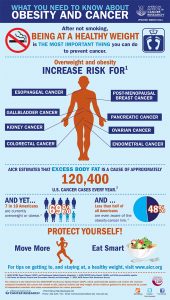A major global report was released today on obesity and the news is grim. The numbers of overweight and obese people around the world have increased dramatically since 1980, in both developing and developed countries and among all age groups, with the United States accounting for 13 percent of the world’s obesity.
The report was published today in The Lancet.
The findings bode ill for cancer prevention: aside from smoking, obesity is the single largest risk factor for cancer. AICR estimates that obesity is a cause of eight cancers, including postmenopausal breast, colorectal and ovarian. Obesity also plays a major role in other chronic disease, such as type 2 diabetes, which also links to increased cancer risk.
The study included data from over 180 countries. Study researchers systematically identified surveys, reports, and studies that provided Body Mass Index data. A BMI of 25 and over is categorized as overweight; 30 and over is obese.
The Lancet report estimates that worldwide, the proportion of adults with a BMI of 25 or greater increased between 1980 and 2013 from 29 percent to 37 percent in men, and from 30 percent to 38 percent in women.
The number of overweight and obese individuals around the world has increased from 857 million in 1980, to 2.1 billion in 2013. In the United States, approximately one-third of both men and women are obese.
More than 50 percent of the 671 million obese individuals in the world live in ten countries (listed in order of number of obese individuals): USA, China, India, Russia, Brazil, Mexico, Egypt, Germany, Pakistan, and Indonesia.
What’s more, the report states, in the past 33 years there are no national success stories on reducing obesity. For policymakers, urgent global action is needed.
There are caveats to the study findings, such as limited data in earlier years. Yet this report builds on earlier research estimating the harms of obesity. In 2010, the study cites, overweight and obesity were estimated to cause 3.4 million deaths.
For individuals, BMI is one indicator of your health; Alice wrote about that here. You can use our BMI calculator to calculate your BMI.
The trial was funded by the Bill & Melinda Gates Foundation.





